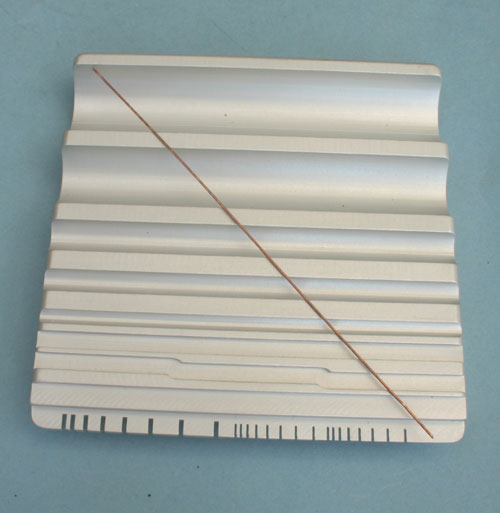| |
BrassAssist Roller Set Mk ‘MC’
by John Prigent

I received the new BrassAssist from The Small Shop EU to use for a projected
modelling book, and it has proved very useful indeed.
It is a neat tool for rolling rounded shapes in etched metal parts –
and it should work just as well on items cut from the brass or copper
sheets and strips that can be found in good hobby shops. I haven’t
tried it on aluminium so can’t offer advice there.
The tool base is a 10 cm (4 inches) square block of aluminium, 1.5 cm
(5/8 inch) thick so the whole thing is quite solid and stable in use.
Into it recesses have been milled to take the rollers, each a perfect
half-circle. The rollers come in five sizes to produce diameters of 2
cm (25/32 inch), 1.6 cm (10/16 inch), 0.8 cm (5/16 inch), 0.5 cm (7/32
inch) and 0.3 cm (1/8 inch). They are solid metal, aluminium for the two
largest, brass for the next two and steel for the smallest so there’s
no risk of bending them. As well as the roller recesses there are milled
ribs to allow easy shaping of etched tie-downs in three different lengths
and two alternative depths. On the front edge of the piece are milled
slots for bending wire to make grab handles; these give four different
widths, each catering for three different wire thicknesses and three different
depths of handle bend if you need to turn out the bottoms of the handles
to represent the type that isn’t butt-welded. And to top it, since
the spacing of the slots is staggered you can use them to produce almost
any size of grab handle from 1 mm up to 6.5 mm inside length – outside
lengths from 3 m to 9.5 mm in the thickest rod, 1 mm diameter, or 2 mm
to 5 mm in the thinnest, 0.5 mm. The whole top surface is engineered to
provide a stable flat surface so you can turn it over to use the second
feature – a soft rolling surface 8 cm (3 1/8 inch) square.
So how does it all work? Very well, actually. You do need to anneal
the etched part before using the rollers, by heating it red hot and letting
it cool. Then simply place it over the appropriate roller recess and press
the roller down into it. This will give you an perfect arched shape, but
if you want a complete cylinder you can turn the base over and use the
next smallest roller with the soft surface to roll the part back and forward
until the cylinder is complete. It is of course important to make sure
the part is at a right angle to the roller recess before you start, if
its angled you’ll end up with the two ends not matching! Although
I haven’t experimented it does appear that rotating the part in
its roller recess and re-applying the roller will allow you to form parts
with more than a half-circle, and might even allow you to make a complete
cylinder without rolling it on the back of the tool. The rolling surface
can of course be used to form cylinders or partial cylinders that don’t
correspond to any of the roller recesses, just use whichever roller suits
and roll the part till you get the larger or smaller curve you need.
The tie-down ribs work equally well, but again the part must be at a
right angle to the rib before you start. I tested the grab handle slots
with both brass and copper wire and found that brass did not shape very
well. The instructions do point out that only soft wire works! It’s
quite easy to bend copper wire (I take it from various sizes of electric
cable bought in 1 metre lengths from a hardware or electrical accessory
shop) into an arc and pop it into the slot you want, then pull down on
both ends with pliers till the top is almost flat and press it completely
flat with the back of the pliers. Then either cut off the ends or, if
you need the non-butt-welded type, turn out the ends and cut them to a
suitable stub. Take out the new handle and flatten the stubs with your
pliers and its ready to fix to the model. Although I managed easily without
doing so, annealing the thicker sizes of wire might make the job easier
still.
There is one thing I should mention: keep your work surface clean while
you use this tool. The soft rolling surface will pick up bits of plastic
shavings, the stubs trimmed from etched parts, etcetera, and these will
spoil the nice soft surface when you try to roll parts on it. The Small
Shop EU does sell replacement rolling surfaces if you ever need one!
Many thanks to them for supplying the BrassAssist. Their website is
at www.smallshopeu.com.
|
|